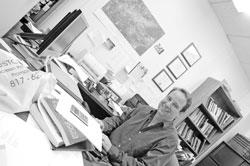In “Ferris Bueller’s Day Off”, heads sag and drool pools on desktops as students fight to remain conscious while their economics teacher drones on about an obscure tariff bill and a revenue curve.
This is not Stephen Quinn’s microeconomics class.
Quinn, professor of economics and the 2007 recipient of the Honors Professor of the Year award, developed the introductory microeconomics course offered at TCU. Along with basic economic principles, the course incorporates game theory, which students get to apply firsthand in the classroom.
“He is not one of those professors whose classes you would fall asleep in,” said Merlyn Antony, a sophomore pre-major and Quinn’s former student.
Usually, at least half of the class received an introduction to supply and demand in high school, but students don’t see these concepts happen around them, Quinn said. Class activities allow students to put those principles to test in the real world.
“In theory, they’ve been introduced to it, and yet when they participate in it, and you write the results on the board, they will see it as that,” Quinn said. “They will make that connection.”
Winning Strategy
Like some students, Quinn began college without declaring a major. But soon he found his calling.
“I just took introductory economics like everybody else, and it clicked,” Quinn said. “I was one of those students who said, ‘Oh, this is obvious. This is how the world works.'”
Quinn attended Rockford College in his hometown of Rockford, Ill. As an honors student, Quinn graduated with a bachelor’s in economics in 1988.
At Rockford, Quinn became a member of the Phi Beta Kappa Society and served as student government president. He also studied abroad in London for a semester.
“London is my home away from home,” he said.
Quinn’s study-abroad experience sparked an interest in English financial history, a subject he decided to pursue as the topic of his doctoral thesis at the University of Illinois at Urbana-Champaign.
Supply and Demand
Every year, Quinn said, schools across the country issue ads publicizing job openings in certain academic departments. Each school is looking for a different specialty. Doctoral candidates search the list of positions available and apply for a job.
“You have almost no geographic control over where job opportunities might be because positions in an academic department only come up every now and then,” he said.
TCU was one of the schools looking for an academic specializing in economic history – Quinn’s field of study.
Quinn joined TCU in 1995 as assistant professor of economics. In 2001, he received tenure and was promoted to associate professor of economics.
“He is simply very good at what he does,” said Michael Butler, professor of economics and Quinn’s colleague. “He is constantly working to improve his classes.”
Cost-benefit
Before moving to Fort Worth, neither Quinn nor his wife had ever been to Texas.
“We feel very fortunate to have landed in Fort Worth,” Quinn said.
Quinn met his wife at the University of Illinois in 1991 – at the brink of the Gulf War. The two scheduled a date, but that night, the United States began to bomb Iraq, prompting her to cancel the date.
“I thought she was just giving me the blow-off. But I asked her again anyways, and she said yes,” Quinn reminisced.
The couple married in 1998 and has two children: Pete, 5, and Jack, 2. Even though Quinn considers his family his most rewarding achievement, he said having children restricts his free time.
“You don’t start growing up until you have kids,” he said. “You truly realize that all this other stuff can go.”
But even under time constraints Quinn is available to help his students.
“Dr. Quinn is really energetic,” said Mary Schruba, a senior middle school education major and Quinn’s former student. “He’s willing to work with you if you’re willing to work with him.”
Quinn said teaching makes him understand things more substantially. He said he finds his job very satisfying.
“There’s a lot more to life than how much you get paid,” he said. “It’s a good job.”





